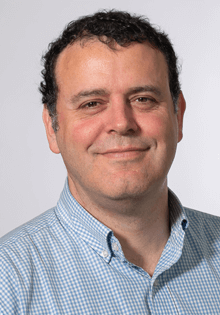Blu Genes Foundation gives UMMS $1.4M to bring Tay-Sachs gene therapy to clinical trial
Date Posted: November 06, 2018 |
|
|
Heather Gray-Edwards, PhD, DVM |
|
 |
|
|
Miguel Sena-Esteves, PhD |
|
 |
|
|
Terence R. Flotte, MD |
The Blu Genes Foundation, a Toronto-based foundation dedicated to the development of gene therapy treatments for rare disease, has donated $1.4 million to UMass Chan Medical School for the advancement of a Phase I/II clinical trial for the genetic disorder Tay-Sachs. The gift from the Blu Genes Foundation will be a catalyst in moving research from the preclinical phase to early stage human trials, according to Heather Gray-Edwards, PhD, DVM, assistant professor of radiology at UMass Chan Medical School.
“This philanthropic investment in our Tay-Sachs research from the Blu Genes Foundation will allow us to take more than a decade of scientific discovery into the clinic, where our novel gene therapy approach will directly impact patient lives,” Dr. Gray-Edwards said.
Tay-Sachs, and a similar disease, Sandhoff disease, are inherited neurologic diseases that occur when genetic mutations prevent cells from producing enzymes needed to break down and recycle materials. Without these enzymes, the materials accumulate to toxic levels, slowly destroying the nervous system. A team of researchers from UMass Chan and Auburn University in Alabama have been working on a gene therapy to correct the enzyme deficiency using adeno-associated virus, or AAV, vectors.
The average life expectancy for children with infantile Tay-Sachs or Sandhoff disease is about three to five years; there is currently no treatment for either disease. The gene therapy in development has shown promise in animal models of these diseases by extending lifespans up to four times those of untreated animals.
In addition to Gray-Edwards, the development team includes Miguel Sena-Esteves, PhD, associate professor of neurology at UMass Chan and principal investigator of the program; Terence R. Flotte, MD, the Celia and Isaac Haidak Professor of Medical Education, executive deputy chancellor, provost and dean of the T.H. Chan School of Medicine, professor of pediatrics, microbiology & physiological systems and RNA therapeutics at UMass Chan, and clinical principal investigator of the trial; and Douglas Martin, PhD, professor of anatomy, physiology and pharmacology at the Auburn University College of Veterinary Medicine.
“We have spent a great deal of time over the past two years conducting preclinical toxicology and efficacy tests and the results provide the supporting data to submit an Investigational New Drug (IND) application to the FDA,” said Dr. Sena-Esteves. “We now are beginning work to file an IND with the FDA for the Phase I/II trial and we hope to secure approval in early 2019. We also have initiated manufacturing of the vectors, which should take approximately five months to complete. These are important milestones in this process that demonstrate real progress toward our goal of launching a clinical trial.”
“Once we have secured the go-ahead from the FDA, we will be ready to quickly enter the clinical phase of this project, which we anticipate happening as early as March 2019,” said Dr. Flotte. “We are excited to work with the National Tay-Sachs & Allied Diseases Association (NTSAD) and the Cure Tay-Sachs Foundation (CTSF), two patient organizations that have been our partners from the beginning of this project and will continue to partner with us as we move into the upcoming trial. NTSAD and CTSF have together invested more than $4 million in our research over the past decade to help get us to this point. Now together with this very generous and catalytic gift from the Blu Genes Foundation, we are one big step closer to making this trial a reality.”
The Blu Genes Foundation is a recently established nonprofit organization that is raising funds to advance gene therapy and find a cure for genetic disorders such as Tay-Sachs. “By strategically investing our philanthropic resources in world class research, our goal is to offer hope to patients and families where currently there is none,” said Joseph Cordiano, chairman of the Blu Genes Foundation. “We are excited to join NTSAD and CTSF in partnering with UMass Chan Medical School and Auburn University at a critical juncture to help make this first-in-human clinical trial a successful reality.”
“The proof-of-concept studies in affected animals are compelling, and the FDA provided a clear path forward to human clinical trials,” said Dr. Martin. “Too many children with Tay-Sachs and Sandhoff have died since we started this project. The time has finally arrived to push back on these diseases. Our single-minded goal is to get a safe and effective therapy to patients and their families as quickly as possible. Thanks to the support of the Blu Genes Foundation, NTSAD and CTSF, achieving our goal is within sight.”
To learn more about Blu Genes, CTSF and NTSAD or to support Tay-Sachs research, visit:
Blu Genes Foundation: www.blugenes.org; info@blugenes.org
Cure Tay-Sachs Foundation: www.curetay-sachs.org; rick.karl@curetay-sachs.org
National Tay-Sachs & Allied Diseases Association: www.ntsad.org; skahn@ntsad.org
Related story on UMassMedNow:
Promising therapy for fatal genetic diseases in children nears human trials